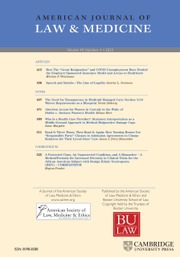No CrossRef data available.
Article contents
Medical Ethics, Malpractice, and Emergency Medical Services: Some Congressional Concerns
Published online by Cambridge University Press: 29 April 2021
Abstract
Today, it is readily apparent that the legal and moral aspects of medical practice are becoming increasingly complex. This is not to say that the practitioners of, say, twenty years ago did not face complex legal and ethical questions. Certainly they did. But for them, such questions were not raised in such diverse ways as they are today.
- Type
- ASLM Annual Oration
- Information
- Copyright
- Copyright © American Society of Law, Medicine and Ethics and Boston University 1975
Footnotes
The following article is adapted from the American Society of Law & Medicine's Annual Oration delivered by Congressman Paul G. Rogers at the Society's Annual Meeting in Washington, D.C. on June 9, 1975 held in conjunction with its First National Conference on the Medicolegal Implications of Emergency Medical Care.
References
1 Roe v. Wade, 410 US 113, 93 S.Ct. 705, 35 L.Ed. 2d 147 (1973).
2 The Senate Judiciary Subcommittee on Constitutional Amendments has set aside a number of proposed constitutional amendments that would overturn Roe v. Wade, supra note 1. See the September 24, 1975 issue of Washington Report on Medicine and Health.
3 For a discussion of the adoption of the Uniform Anatomical Gifts Act by various states, see 27 Baylor L. Rev. 154-6 (1975)Google Scholar.
4 Such problems include the sterilization of uninformed patients, the use of mental patients and prisoners for drug and other experimentation, the Alabama syphilis experiments, and most recently, experiments on aborted fetuses. Such problems go to the very essence of medical law and ethics, and they cause me and my colleagues on the House Health Subcommittee great concern.
5 Federal Emergency Medical Services Act, U.S. Code 1970, Title 42, §§ 300d et seq.
6 DHEW, State Statutes on Emergency Medical Services (May, 1972).
7 Id.
8 Id.
9 Id.
10 Id.
11 Id.
12 Id.
13 Id.
14 Id.
15 Id.
16 Id.
17 U.S. Code 1970, Title 42, §§ 300d et seq.
18 Although we could probably use 400 systems, we have made these accomplishments with only limited funds at our disposal. We have run the entire program, with grants, administration and training, on less than $65 million over two years.




